Managers requested biological passport data from UCI, says Amadio
Teams were not threatened with public revelations by Pat McQuaid


Liquigas-Cannondale manager Roberto Amadio has revealed that it was the team managers themselves who requested that information about riders with suspect biological passports be made more freely available during a fractious meeting with the UCI in Brussels on Monday.
L’Équipe reported on Tuesday that UCI president Pat McQuaid had informed managers that he held precise information on each team’s riders thanks to the biological passport system. According to the article, McQuaid “brandished the spectre of public revelations that would cause damage.”
However, Amadio refuted the idea that the team managers were threatened by the release of such information, and instead explained that he was among the managers who had requested that the UCI inform teams of which riders had suspect values.
“The situation isn’t exactly the one reported in the article,” Amadio told Tuttobiciweb.it. “It’s not that McQuaid threatened to pull out the list of ‘targeted’ riders. It was first Bjarne Riis and then I – given that we had our backs to the wall – who asked to be informed, to know who are the target riders, who are the riders at risk and who are the athletes who do not fill out their whereabouts forms punctually.
“We can no longer accept to be informed of things that are awry only after they have happened. If we are asked to intervene with greater force [in curbing doping – ed], it is right to give us the instruments to do that.”
While Amadio recognised that there may be privacy issues involved in the release of sensitive biological passport data, he called on all parties to work together in order to overcome such problems in order to find a transparent system. “Otherwise they cannot ask us for what we cannot give,” he said.
Team managers left Monday’s meeting in protest at what they felt to be the UCI’s failure to engage seriously with the contentious issue of the ban on radio earpieces in races. Managers were aggrieved that the matter was placed towards the end of the meeting’s agenda, and that three journalists were invited to speak on the matter. Rodrigo Beenkens, Philippe Brunel and Patrick Chassé were the three journalists in question.
Get The Leadout Newsletter
The latest race content, interviews, features, reviews and expert buying guides, direct to your inbox!
“We didn’t like that there were three journalists there talking without having been informed of their presence,” Amadio explained. “We though we were going to discuss a technical problem between the UCI and the teams, not participate in a debate.
“But the serious thing was the presentation from an official who explained the use of radios, saying that we directeurs sportifs did not have the authority to give security information to riders during races, that this was up to the police. At that point, almost all of the teams got up and left. What sense was there in staying?”

Barry Ryan was Head of Features at Cyclingnews. He has covered professional cycling since 2010, reporting from the Tour de France, Giro d’Italia and events from Argentina to Japan. His writing has appeared in The Independent, Procycling and Cycling Plus. He is the author of The Ascent: Sean Kelly, Stephen Roche and the Rise of Irish Cycling’s Golden Generation, published by Gill Books.